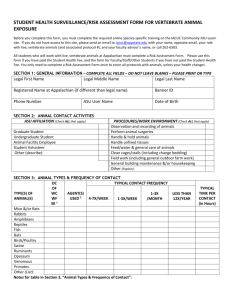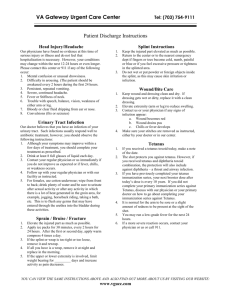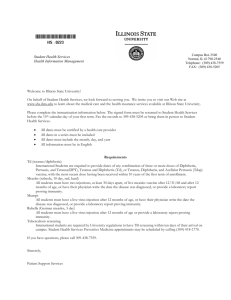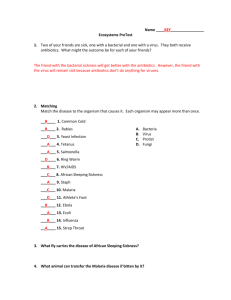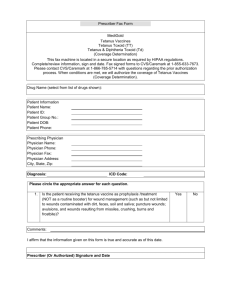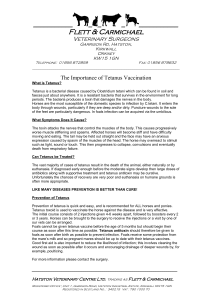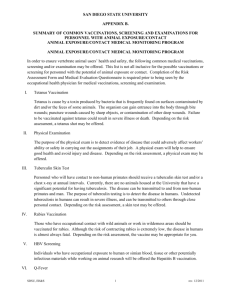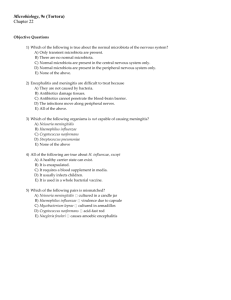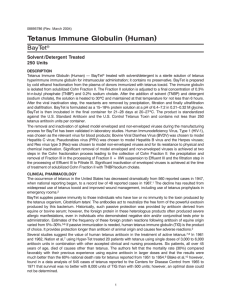MR - University of New Hampshire
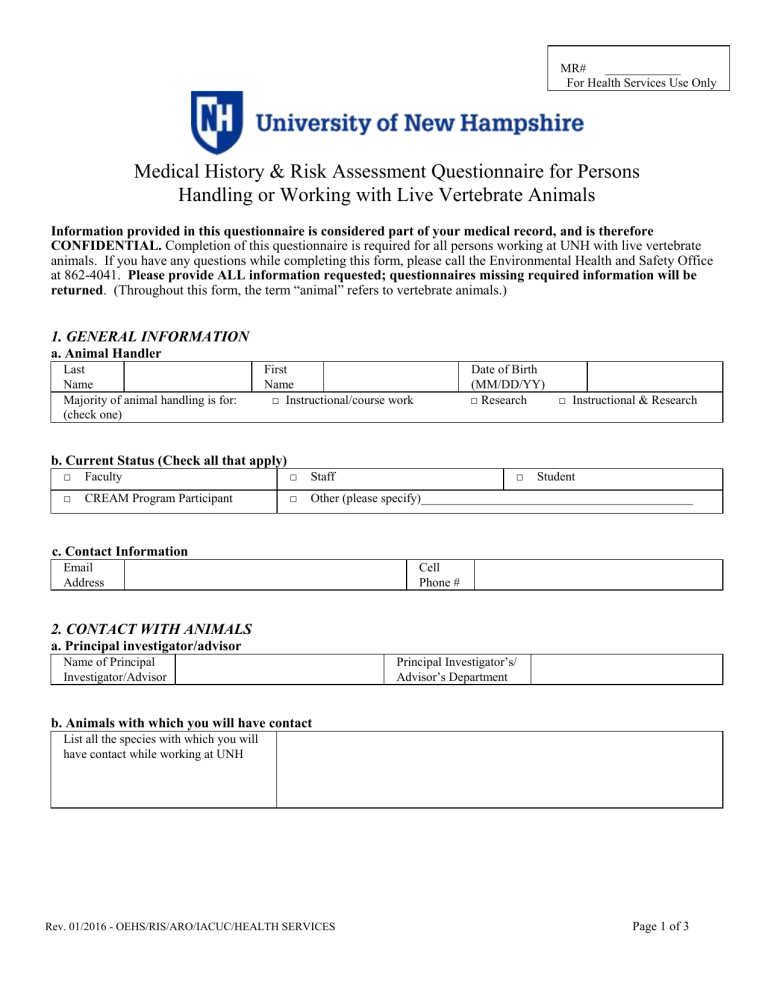
MR# ____________
For Health Services Use Only
Medical History & Risk Assessment Questionnaire for Persons
Handling or Working with Live Vertebrate Animals
Information provided in this questionnaire is considered part of your medical record, and is therefore
CONFIDENTIAL. Completion of this questionnaire is required for all persons working at UNH with live vertebrate animals. If you have any questions while completing this form, please call the Environmental Health and Safety Office at 862-4041. Please provide ALL information requested; questionnaires missing required information will be returned . (Throughout this form, the term “animal” refers to vertebrate animals.)
1. GENERAL INFORMATION
a. Animal Handler
Last
Name
First
Name
Date of Birth
(MM/DD/YY)
Majority of animal handling is for: □ Instructional/course work □ Research □ Instructional & Research
(check one) b. Current Status (Check all that apply)
□ Faculty □ Staff □ Student
□ CREAM Program Participant □ Other (please specify)___________________________________________ c. Contact Information
Address
2. CONTACT WITH ANIMALS
a. Principal investigator/advisor
Name of Principal
Investigator/Advisor b. Animals with which you will have contact
List all the species with which you will have contact while working at UNH
Cell
Phone #
Principal Investigator’s/
Advisor’s Department
Rev. 01/2016 - OEHS/RIS/ARO/IACUC/HEALTH SERVICES Page 1 of 3
c. Animal handing risks and medical requirements (Check all categories that apply and PROVIDE the requested information)
Category
1
Animals in this category may include : Fish, reptiles or amphibians.
□
Associated risks : Potential for cuts, bites and scratches from the animal or trapping/housing apparatus, zoonotic diseases (e.g., Salmonella spp.)
Medical requirements : Up-to-date tetanus immunization. (To be valid, tetanus immunization must have been received within 10 years*.)
Category
2
□
Category
3
□
Date of your last tetanus vaccine (MM/DD/YY): ______________________________________
Animals in this category may include : Laboratory animals (e.g., rats, mice, guinea pigs, hamsters, gerbils, other rodents, rabbits), or domestic birds.
Associated risks : Some potential for risk of injury from bites and scratches, zoonotic diseases (e.g., Salmonella spp.), allergies.
Medical requirements : History and physical exam, allergy evaluation and education, up-to-date tetanus immunization. (To be valid, history and physical exam must have been conducted within 5 years, and tetanus immunization must have been received within 10 years*.)
Date of your last physical exam (MM/DD/YY): ______________________________________
Name, phone number, and address of your healthcare provider: ________________________________________
__________________________________________________________________________________________
Date of your last tetanus vaccine (MM/DD/YY): ______________________________________
Animals in this category may include : Sheep, cattle, horses, goats, other farm animals, deer, wild rabbits, wild rodents, wild birds, feral animals as well as unvaccinated dogs and cats.
Associated risks : Significant potential for injury from bites and scratches, kicks and crushing, zoonotic diseases,
(e.g., Cryptosporidium spp., Histoplasma spp., Influenza virus , Rabies virus, Salmonella spp., Toxoplasma spp.), and allergies.
Medical requirements : History and physical exam, up-to-date tetanus immunization.** (To be valid, history and physical exam must have been conducted within 5 years, and tetanus immunization must have been received within
10 years*.)
What is your risk of exposure to rabies?
Low
Moderate
High
Date of your last physical exam (MM/DD/YY): ______________________________________
Name, phone number, and address of your healthcare provider: ________________________________________
___________________________________________________________________________________________
Date of your last tetanus vaccine (MM/DD/YY): ______________________________________
Completion of rabies series (if appropriate) (MM/DD/YY): ______________________________________
(**It is strongly recommended that all persons having contact with live raccoons, skunks, bats, fox or those animals’ tissues in an unfixed state undergo the rabies vaccination process. This is based on the local statistics, which reveals these species to be the most likely to carry the rabies virus.)
* Available from UNH Health Services (charges are covered for these services by the University if required to conduct research and instructional activities involving vertebrate animals).
Rev. 01/2016 - OEHS/RIS/ARO/IACUC/HEALTH SERVICES Page 2 of 3
3. HANDLER HISTORY
(Feel free to attach a separate sheet to explain items checked in this section, or if you wish to make the physician aware of any concerns or problems in regard to your contact with animals.) a. Do you experience any of the following when you work with/are exposed to animals? (Check all that apply)
□ Watery, burning, itchy eyes □ Wheezing □ Chest tightness
□ Nasal dripping
□ Sneezing
□ Shortness of breath
□ Coughing
□ Rash
□ Hives
Do any of these symptoms interfere with your ability to work with animals? YES □ No □
□ If yes, please explain: b. List any major or chronic health problems that you have, including allergies.
1.
2.
3.
4.
5. c. If any health problems have interfered with your ability to work with animals, please describe: d. Are you under the care of a healthcare provider for any of the above symptoms?
Yes □ No □ e. Do you wish to discuss any of the above symptoms or problems with a healthcare provider at UNH Health
Services? Yes □ No □
Signature of Person
Completing this
Questionnaire Date
Thank you for completing this questionnaire. Please send to UNH Health Services by one of the following methods:
Via email as an attachment (in PDF format) to: Sandra.Duvall@unh.edu
Or
Hand-deliver in an envelope to: Sandra Duvall, UNH Health Services, 4 Pettee Brook Lane, Durham, NH 03824
For Office Use Only:
Reviewed by
Follow-up needed?
Follow-up performed by
□ No □ Yes
Date
Date
Rev. 01/2016 - OEHS/RIS/ARO/IACUC/HEALTH SERVICES Page 3 of 3
